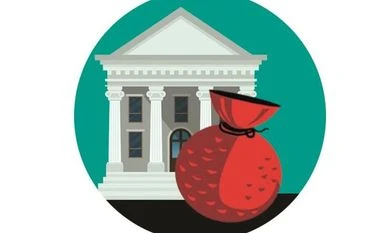Shares of private banks took a beating post the Reserve Bank of India's policy decision, where the
Monetary Policy Committee (MPC) decided to keep repo rate unchanged at 6.5 per cent for a sixth straight policy.
The Nifty Private Bank index tumbled 1.7 per cent intraday led by losses in Axis Bank (3 per cent), ICICI Bank (2.6 per cent), Kotak Mahindra Bank (2 per cent), and HDFC Bank (1.5 per cent).
By comparison, the Nifty50 index slipped 0.9 per cent intraday, but the Nifty PSU Bank index soared over 2 per cent.
According to analysts, a status quo on interest rate meant lenders may have to either hold or raise rates further in a bid to mobilise higher deposits.
As private banks are operating at relatively higher loan-to-deposit ratio (LDR), a further hike in rates would compress their lending capacity or hit margins.
"February 8th's RBI policy highlights that deposit rates will continue to remain high, an area which is a painpoint for private banks. PSBs are operating at low LDRs, leaving room for them to lend more. Private banks, on the other hand, have high LDRs. Any hike in rates from here on could hit their margins and profitability," said Deepak Jasani, head of retail research at HDFC Securities.
At the end of the December quarter, HDFC Bank's reported LDR stood at 110 per cent, ICICI Bank at 86.6 per cent, Axis Bank at 92.8 per cent, and IndusInd Bank at 89 per cent.
Against this, State Bank of India reported LDR of 74 per cent, and Bank of Baroda 82 per cent.
Meanwhile, the net interest margin (NIM) of HDFC Bank, India’s largest private sector lender, declined from 4.1 per cent in Q3 FY23 to 3.4 per cent in Q2 and Q3 of FY24.
ICICI Bank's NIM declined to 4.43 per cent in Q3 FY24, compared to 4.53 per cent in Q2 FY24 and 4.65 per cent in Q3 FY23.
According to analysts, private banks witnessed a sell-off after policy as policy was hawkish compared to expectations of a dovish stance.
"Banks need to garner deposits, especially retail deposits aggressively. However, if they cannot maintain the pace of deposit growth, it could weigh on margins and/or credit growth. Margins will continue to face headwinds for the next couple of quarters, with cost of funding (CoF) moving upward. In our view, return on assets (RoA) for banks have peaked out. We continue to favour larger banks like ICICI Bank, SBI, and Bank of Baroda," said Naveen Kulkarni, Chief Investment Officer, Axis Securities PMS.
Going ahead, analysts expect investor money to move towards PSU banks from private banks amid hopes of strong earnings and valuation comfort.
'Conservative policy' The Reserve Bank of India's Monetary Policy Committee (RBI MPC) has decided to keep the repo rate unchanged at 6.5 per cent for the sixth consecutive time,
Governor Shaktikanta Das announced on Thursday. He said the decision was taken by a majority 5-1.
The repo rate was last changed in February 2023, when it was hiked from 6.25 per cent to 6.5 per cent. Between May 2022 and February 2023, the repo rate was raised by 250 basis points (bps).
Das said that the impact of the 250 basis points hike in the repo rate is yet to unfold fully.
"On the global front, recent data points to continued robustness of growth against general expectations of a slowdown. The US Fed removed the tightening bias from its statement leading to a question of when the rate cut cycle begin. Geopolitical unrest in the middle east and Red Sea region continue to possess key risks to fledgling global recovery. The MPC, thus, maintained a status quo on rates as well as its stance (withdrawal of accommodation) as it believes the transmission of past rate hikes remains incomplete and the 4 per cent CPI target may still be a bit distant. The risks to inflation come from volatile food prices and potential supply side shocks from global factors. Overall, the RBI remains a bit conservative in this policy," said Mihir Vora, CIO, TRUST Mutual Fund.
Unlock 30+ premium stories daily hand-picked by our editors, across devices on browser and app.
Pick your 5 favourite companies, get a daily email with all news updates on them.
Full access to our intuitive epaper - clip, save, share articles from any device; newspaper archives from 2006.
Preferential invites to Business Standard events.
Curated newsletters on markets, personal finance, policy & politics, start-ups, technology, and more.
)